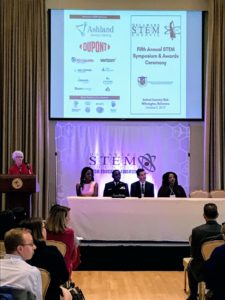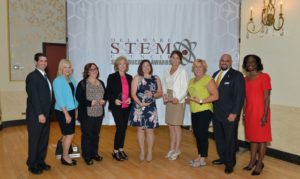Reflecting on equity at the Fifth Annual Delaware STEM Symposium
The Fifth Annual Delaware STEM Symposium was held at DuPont Country Club in Wilmington last Tuesday, Oct. 8. The event was hosted by the Delaware STEM Council in conjunction with the Delaware Foundation for Science and Mathematics Education (DFSME), with primary sponsors Ashland and DuPont. The theme for this year’s symposium was equity, as throughout the conference, educators, business leaders, and policy-makers tackled head-on the challenges of working to make STEM in Delaware more equitable for all; students, educators, and workers alike.

DE Secretary of Education, Susan Bunting, and STEM Syposium Panelists
The symposium began with a panel discussion between Delaware Military Academy students Seth Lawrence and Jacqueline Means, Brandywine High School educator and former Delaware STEM Council Co-chair Judson Wagner, and Candice Roundtree, a chemical engineer at Delmarva Power. The panel, comprised of the student, educator, and business leader perspectives, addressed their own experiences with equity or inequity, as well as barriers they may have faced in their educations or careers in STEM fields.
“I live in Southbridge, Wilmington, Delaware,” Means said. “In fact, only 40% of teens living there graduate with a high school diploma. I saw that there was a need for STEM programs, especially free ones.”
At 16 years old, Means, the self-described “STEM Queen,” founded the Wilmington Urban STEM Initiative and hosts Girls Empowerment STEM events, which offer free, accessible STEM programs and educational opportunities for young girls and students in Wilmington.
“I want to equip them with the knowledge and confidence that they, as females, can succeed in the STEM field,” Means described in her mission statement on her personal website.
Seth Lawrence also leads the way as both a student and a young educator. As an aspiring pilot at Delaware Military Academy, Lawrence joined the United States Air Force Auxiliary, and is now a 2nd Lieutenant Officer and leader among younger students who share the same enthusiasm for aviation. Lawrence is also involved in STEM and STEM equity organizations such as the Forum to Advance Minorities in Engineering (FAME) based in Delaware, and is an advocate for similar programs, such as the Organization for Black Aerospace Professionals (OBAP).
“Aviation takes on literally every aspect of STEM,” Lawrence said, recalling the origins of his passion for aviation. “Once the wheels took off and I wasn’t touching the ground anymore, I was like, ‘Whoa, I’m in the sky. I gotta do it now.’ Since that moment, that created a drive for me. Now I have the opportunity to teach the younger kids who just joined, who are maybe in the lower ranks of Airman or Airman First Class. I see myself in them, and I remember I was really excited about aviation, and I still am now.”
Delaware Secretary of Education Dr. Susan Bunting moderated the panel discussion. Prior to joining Governor John Carney’s cabinet in 2017, Bunting herself was a veteran Delaware educator and former superintendent of the Indian River School District, attuned to the worlds of equity, diversity, and accessibility in the classrooms. According to Bunting, she visits over 100 Delaware schools over the course of the year.
“I’m always the advocate for the kid who has no one else to speak for him,” Bunting said. “I’m always concerned about programs that are there. I want to make sure that students are not deprived of that opportunity. I think we as educators can do a lot more to assure [them].”
The panel discussion was followed by a “Cross the Line” activity, in which participants engaged in an exercise which challenged their comfort zones, introducing them to the complexity of pursuing equity in the classroom or workplace. The activity, which instructed participants to cross a line every time an announced quality of race, gender, or identity was applicable to them, highlighted the dynamics of diversity and difference, community versus isolation, setting an example versus joining a crowd.
“As educators, how do we navigate power in our classrooms? Do we reinforce already existing hierarchies? Do we challenge them? Do we complicate them? And, if so, how do we make that transparent,” a moderator asked in the evening’s following segment, “Real Conversations,” wherein participants broke into separate groups to reflect on the exercise.
“Kids need more teachers who look like them, and who have had common experiences as them,” Anne Pfaelzer de Ortiz, Director of Development & Operations for DFSME, said. “How do you open the eyes of the teachers and of the educational system? So that, even if you don’t look like the kid, you accept a student and accept what he or she brings. And instead of passing over the kid, you open doors. It’s a huge amount of work that teachers do, and a huge amount of power that they have – and equal to the power that a parent or family member has.”
In concluding the first half of the symposium, closing remarks were made by DFSME Executive Director Randy Guschl and FAME Program Director Lakia Belcher, as well as a final address from Lieutenant Governor Bethany Hall-Long.
The Lt. Governor also represents another Delaware government official with an extensive background and relationship with STEM and STEM education, having pursued nursing in her undergraduate studies and later completing her Ph.D. in health policy and nursing administration.
“Everyone should have equal opportunity,” Lt. Governor Hall-Long said. “A strong science background is a must for the Delaware workforce. And young children, whether it’s our inner cities or our rural communities, should have the same opportunity. So, for me, equity is paramount.”
A brief intermission was followed by the second half of the symposium, which included video correspondence and messages from Congresswoman Lisa Blunt Rochester, Senators Tom Carper and Chris Coons, and Governor John Carney, all leading up to the evening’s Delaware STEM Educator Awards ceremony.
“Delaware’s future experts on science, technology, and engineering all have to start their learning somewhere, and you’re inspiring them to succeed,” Carney said in a video message. “Those being honored tonight are perfect examples of the diverse, innovative, dedicated educators that are guiding Delaware.”
Rochester, Coons, and Carney also commended the evening’s STEM educators for their dedication, as well as the council’s ambitions for addressing and improving equity across the board of Delaware STEM as the symposium’s central theme.
The first place Delaware STEM Educator Awards were received by Smyrna Elementary school library media specialist Heather Fitzgerald, Millsboro Middle School science teacher Sarah Betlejewski, and Caesar Rodney High School computer science teacher Margaret Birch. Second and third place winners also included, respectively, William Penn High School agriculture teacher Karen Ferrucci and Sussex Technical High School science teacher Michele Thomas.

Lt. Governor Bethany Hall Long (2nd left) and Ashland Sr. VP & Chief Commerical Officer, Vito Consiglio (2nd right) with STEM Awardees
The symposium concluded with a final opportunity for its diverse range of attendees – from educators and students to business and industry leaders – to collaborate, socialize, and network.
“This organization is some of the best people I’ve met, that are pure to the soul of trying to help other human beings. And to me, that means a lot,” Vito Consiglio, Senior Vice President and Chief Commercial Officer of Ashland, said.
Consiglio prioritizes Ashland’s attendance, sponsorship, and support of the Delaware STEM Symposium, emphasizing the importance of the relationship between businesses and the community.
“For us, this is something we think has a lot of value,” Consiglio said. “It helps to feed the opportunities within our organization to get great candidates that live in the state of Delaware. So we want to help nourish that bed of people, and the only way to do that is to play an active role in the community.”
Jon Manon, President of DFSME and Associate Director of Mathematics at the University of Delaware’s School of Education, expressed his gratitude for the Delaware STEM Council on its ability to assemble a breadth of STEM leaders for a day of collaboration, and the inherent optimism of such a prospect.
“It’s the perfect nexus of educators, business and industry, and government coming together and, in very honest ways, saying, ‘How do we move forward and how do we reinvent this? How do we make it better?’” Manon said. “It’s sort of the perfect storm, if you will. I suppose other states have this mechanism but because of the size and connectedness of Delaware, this really augurs well for the future of STEM education in Delaware.”
Leaders in Delaware STEM will once again assemble for next year’s symposium, to be held in April 2020. For updates on future announcements for the upcoming date and location, further information and additional resources can be found at the official Delaware STEM Council website, https://delawarestem.org/.
To register for next year’s ceremony or to apply for the Delaware STEM Educator Awards, visit https://delawarestem.org/symposium-educator-awards/.
————————————————————-
Jan Castro is a junior at the University of Delaware, studying English and journalism. He is a Delaware native from Hockessin and has been a proud student of Delaware educators. After college, he hopes to pursue a career in journalism, feature writing, and magazine writing.
